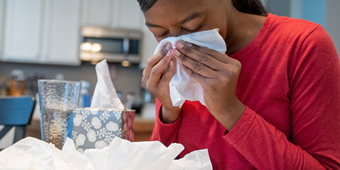What to Know About Cystic Fibrosis

Answer a few questions and we'll provide you with a list of primary care providers that best fit your needs.
Cystic fibrosis (CF) is an inherited disease that causes lung infections and difficulty breathing. It gets progressively worse over time.
CF affects:
- Your lungs. Mucus clogs your airway and traps germs.
- Your pancreas. Mucus limits your body’s ability to absorb food and nutrients.
- Your liver. Thick mucus often causes liver disease.
- A man’s ability to have children.
A child has a 25 percent chance of being born with CF if both her parents are carriers of the disease – that is, they each have a defective CF gene. However, carriers typically are healthy and don’t know they carry the defective gene.
How And When Is CF Diagnosed?
Most newborns are screened for CF. That’s why the disorder is usually diagnosed by the age of two. Yet you could be diagnosed as an adult. Testing for CF usually involves:
- A newborn screening
- A sweat test, which measures the amount of salt in your sweat
- A carrier test, which examines blood from each parent to determine if they carry a defective CF gene
- Evaluation by a CF specialist
A child has a 25 percent chance of being born with CF if both her parents are carriers of the disease.
 What Are the Symptoms Of CF?
What Are the Symptoms Of CF?
The most common symptoms of CF are:
- Skin that tastes salty
- Frequent coughing
- Frequent lung infections like pneumonia or bronchitis
- Wheezing or shortness of breath
- Poor growth or weight gain in spite of a good appetite
- Difficult bowel movements
Not every person with CF has the same symptoms, and the severity of symptoms can vary. But CF is a progressive disease that worsens as you get older.
However, treatment of CF has improved over the years. In the 1950s, people with CF often died in childhood. Advancements in CF care has enabled many to live to adulthood including college, careers, and marriage. More than half of people today with CF are over 18 years old. There currently is no cure.
How Is CF Treated?
To slow the progression of CF and the damage it does to your lungs, it’s important to be treated properly. If you have CF you need:
- Airway clearance therapy This can be done manually or with devices like a vest that you wear to shake loose the mucus in your airways, enabling you to cough it up.
- Medication to thin the mucus
- Medications to help your body absorb food and nutrients
- Antibiotics to treat the bacteria in mucus
- Fitness plan. To maintain your weight you need to consume a very large number of calories. Being physically active also is important to keep your lungs healthy.
New treatments continue to be researched.
Answer a few questions and we'll provide you with a list of primary care providers that best fit your needs.
Sources: American Lung Association; Cystic Fibrosis Foundation; National Institutes of Health; Cystic Fibrosis, Healthwise, 12/12/2018




